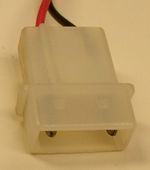Difference between revisions of "Remote Switching Control Bus"
(A good start) |
(Add image, etc) |
||
| Line 1: | Line 1: | ||
| − | The '''Remote Switching Control Bus''' was a power control [[bus]] used across many [[Digital Equipment Corporation|DEC]] product lines to allow remote control of power. It contained three lines: a [[ground return]], a 'power on', and an 'emergency shutdown'. (Not all devices used the last.) | + | The '''Remote Switching Control Bus''' was a power control [[bus]] used across many [[Digital Equipment Corporation|DEC]] product lines to allow remote control of power. It contained three lines: a [[ground return]], a 'power on', and an 'emergency shutdown'. (Not all devices used the last, e.g. the illustrated example below.) |
| − | + | [[Image:PwrControlBusConn.jpg|150px|thumb|right|Cable connector]] | |
| − | The male shell (housing) was a 1-480304-0, and took 61173-1 | + | The bus was connected using 3-pin AMP MATE-N-LOK connectors: all units with a remote control input used a male shell (with female sockets, i.e. female pins); all the cables (normally 3-conductor, #22 gauge, but 2-conductor is seen, as to the right) had female shells (with male pins), on both ends. |
| + | |||
| + | The male shell (housing) was a 1-480304-0, and took 61173-1 sockets; the female shell was a 1-480305-0, and took 61174-1 or 61118-4 pins. (There are a large number of different pin options: 30-22, 24-18, and 20-14 gauge; tin and gold plated; and brass and phosphor-bronze material. The part numbers given are for tinned brass, 30-22 gauge.) | ||
| + | |||
| + | AMP has been bought by TE Connectivity, but these MATE-N-LOK connectors are still in production, and available from the usual suppliers. | ||
[[Category: DEC Hardware]] | [[Category: DEC Hardware]] | ||
Revision as of 15:24, 20 September 2018
The Remote Switching Control Bus was a power control bus used across many DEC product lines to allow remote control of power. It contained three lines: a ground return, a 'power on', and an 'emergency shutdown'. (Not all devices used the last, e.g. the illustrated example below.)
The bus was connected using 3-pin AMP MATE-N-LOK connectors: all units with a remote control input used a male shell (with female sockets, i.e. female pins); all the cables (normally 3-conductor, #22 gauge, but 2-conductor is seen, as to the right) had female shells (with male pins), on both ends.
The male shell (housing) was a 1-480304-0, and took 61173-1 sockets; the female shell was a 1-480305-0, and took 61174-1 or 61118-4 pins. (There are a large number of different pin options: 30-22, 24-18, and 20-14 gauge; tin and gold plated; and brass and phosphor-bronze material. The part numbers given are for tinned brass, 30-22 gauge.)
AMP has been bought by TE Connectivity, but these MATE-N-LOK connectors are still in production, and available from the usual suppliers.
